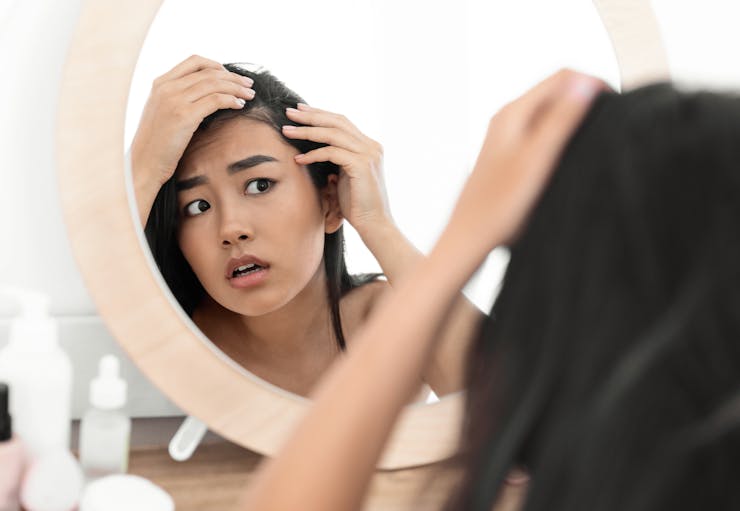The list of things cannabis can do for you, your health, and your body keeps growing like a weed.
A 2023 study has found hemp extract may aid in hair regrowth for alopecia sufferers. The study followed patients with alopecia over a 6-month period, and found an average of 246% hair regrowth—with some patients achieving as much as 2000% hair regrowth. This is excellent news for sufferers of this common condition, who make up around 2% of the world’s population. Way to put a new spin on hair “growing like a weed.”
How hemp helps hair loss
This isn’t the first time that hemp has been studied for hair loss. The plant has shown promise for hair growth due to the properties of certain cannabinoid compounds it contains: CBD, CBDV and THCV. These cannabinoids block signaling of CB1 receptors, which play an important role in the hair growth cycle.
Previous studies found that THC, which activates CB1, can actually reduce hair growth, and has been suggested as a treatment for unwanted hair. CBD, on the other hand—especially in lower doses—was found in prior research to increase hair growth by blocking this key receptor.
Hair follicles usually cycle from a growth, or “anagen,” phase into a “catagen” phase, where cell death of the follicles causes hair to fall out; the growth phase can last up to 6 years. But with alopecia, the natural cycle of hair growth is disrupted, and follicles shift prematurely to the catagen phase. This leads to hair loss.
Since CBD blocks CB1, researchers have tested it in the past. They found up to 93.5% increase in hair regrowth. In this new study, researchers wanted to see what would happen if extracts with CBD, THCV and CBDV were used.

Recipe for regrowth?
To investigate hemp extract’s benefits, this study followed 15 men and 16 women with alopecia, with ages of participants ranging from 31 to 64. The subjects were given 1 oz per month of a topical with hemp extract, and told to apply a thin layer to the balding area each morning.
On average, the daily dose was about 33 mg of the full-spectrum hemp extract, with 60% CBD, 12.63% CBDV, and 3.71% THCV. Each ounce of the formulation also contained 5 grams of menthol derived from 600 grams of peppermint oil, which has also been found effective for inducing a growth phase in hair. This was infused into a base of emu oil as a carrier. No other hair growth treatments were used during this time.
To measure the product’s success, researchers counted the number of hairs in the balding area, before and after 6 months of treatment. They even tattooed the subjects’ scalps to ensure the same area was accurately counted. Photographs were also taken for an independent physician to evaluate the visual differences.

Hemp outperforms conventional hair treatments
After the study concluded, the results were noticeable. All subjects in the case had some regrowth, ranging from 31.25% to 2000%, with an average regrowth of 246% in men and 127% in women. All subjects reported they were “happy” or “very happy” with their own perception of the hair regrowth.
The independent physician also found improvements, reporting that all subjects had mild to extensive improvements in their scalp coverage.
Impressively, these results not only outperformed using CBD alone, they also outperformed oral finasteride and 5% minoxidil foam, the two main medical treatments for alopecia.

Hemp or mint: What’s working?
Despite these encouraging results, it’s important to note limitations with the study. This was a small case study, without a placebo group or double-blind procedures. With this type of study, it’s hard to rule out other factors at play that might be leading to the regrowth. While it gives us important insight into how effective hemp could be, much larger, more structured, experiments are needed to confirm the results.
In addition, using peppermint oil has already been shown to improve hair regrowth, and may contribute to the growth beyond what could result from the hemp extract alone. Therefore, the effects of the peppermint versus the hemp are hard to attribute.

Low-dose CBD is key for best results
Those considering using hemp extract for alopecia should always consult a doctor beforehand. No negative side effects were reported in this study, and topical hemp extract is generally considered safe. Still, safety studies have not been performed for this mixture, nor for using hemp extract in combination with other hair loss treatments.
Importantly, the study also suggests that too much CBD could cause a reversed effect, similar to the effect seen with THC, potentially leading to worsening hair loss—a low-dose CBD regimen is crucial for efficacy. The study found benefit with dosing around 33mg of a 60% CBD hemp extract. Using much more than this could cause hair loss, so apply with caution.





